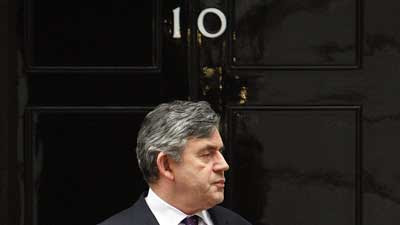
Gordon Brown will seek to regain the political initiative today after a week of turmoil surrounding his leadership by addressing MPs on his plans to clean up Parliament.
The PM will update the House of Commons on progress towards the introduction of an independent regulator for Parliament in the wake of the MPs’ expenses scandal.
He will also look at the wider debates on reform of the House of Lords, and the modernisation of voting methods for Westminster elections.
The moves are designed to show Mr Brown has a forward-looking agenda, and came as Foreign Secretary David Miliband said Labour had “settled” its leadership question.
In an attempt to draw a line under the failed efforts to oust Mr Brown, Mr Miliband said that even the “leading contender” to replace the PM, Home Secretary Alan Johnson, was backing him “to the hilt”.
Mr Miliband said that when news came through of James Purnell’s resignation from the Cabinet on Thursday night, he immediately assured Business Secretary Lord Mandelson that he would not follow his exit.
James Purnell: Why I Had To Resign
However, he dodged the question of whether he “flirted” with the idea of resignation, saying only: “Flirtation is dangerous for married men, I’m not going to get into that.”
Mr Brown yesterday chaired the first meeting of the National Democratic Renewal Council, set up to develop policies for reform of Parliament.
Today’s statement will spell out the Government’s position on issues ranging from a new code of conduct for MPs to strengthening the role of parliamentary select committees in scrutinising the executive.
Mr Brown is likely to unveil legislation to end the system of parliamentary self-regulation and create a statutory independent parliamentary standards authority, so that MPs will no longer decide their own pay and expenses.
On electoral reform, Downing Street played down reports that Mr Brown will propose replacing the first-past-the-post system with an alternative system similar to that used in the London mayoral election, where voters number candidates in order of preference.
A political source at No 10 said the Prime Minister was expected to say only that discussions would form part of the wider debate on renewal of British democracy, but any changes would have to be subject to a referendum.
He is not expected to put his weight behind any particular voting method or make firm proposals for electoral reform at this stage.
No comments:
Post a Comment
use